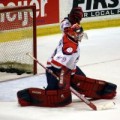Part 3
Interviewer: Let's get on to this sempi kohi because while it's very strong in Japan and I don't think it's unique to Japan - I think it's common in other Asian cultures. I'm wondering Mark, when you played with the team as a professional there, and we, of course, are dealing now with men who are in their twenties and thirties, how big a factor was this sort of this Japanese sempi kohi system on the team where you played?, Mark: Yeah, you know, the team that I played on it was a factor from what I understood it was much less a factor than it had been in the past. When I was in Nikko, the sempi kohi system existed, but not to the extent that I understood it did in the past. We had a coach, Herb Bockabiashi, who had played twenty years before, and I think the sempi kohi system was much stronger then. In the past, I don't know, ten or fifteen years, they've had a lot of Canadian coaches in the Japanese hockey league. Of course, that's one of the first things the Canadian coaches try to change. They may not be able to change it right away. Very often it takes a few coaches to make an impact. Over time, while I was there, the younger players, more and more of t hem, were some of the better players and were not afraid to go in there. In fact, some of them took pleasure in going in there and hitting an older guy or taking a puck away from an older guy. In the past I think that just wasn't done. Either because the young guys never got off the bench or just because of the respect factor or well, that guy is just who he is and I better not hit him or take the puck away from him. Obviously, you can not play competitively and play that way, at least not from our point of view here. Our point of view here in any game is that you play as hard as you can and do whatever it takes to win.
Interviewer: You know, we should explain that sempi means senior, and kohi means is a junior. It's not just from the other team that they are reluctant to take the puck away from a sempi, but it's even in terms of the rituals on your own team. That the sempi, if you are a junior player, you have to carry their bags, whatever and so forth. Was this a factor on your team, or did everyone treat each other as equals?
Mark: Again, yeah, that existed for us for sure, we had a handful of the young guys did the dirty work, so to speak, you know, carried the skate sharpener and helped out where help was needed so the older guys could more or less take it easy, more or less. Our situation was a little different too, because we were a community-run team, where as all the other teams on the league were company teams. I think on the other teams perhaps, that's a little stronger - the sempi kohi thing, like OG Paper and Hiku or Sabu, those teams tended to have a little more of that things. Where our team was community owned there wasn't that fear. If you're on a company team you're going to have to deal with that guy for a long, long time - your sempi. Yeah, for sure, the young guys did the dirty work to a certain extent that exists here too, and that exists here in Canada as well - the rookies here have to do stuff - that exists here, too.
Interviewer: So, Cam, you had those two years in Japan and you were, what, one year in China?
Cam: Four months.
Interviewer: Four months in China. Have you had other foreign experiences or have most of your other involvements been here in Canada?
Cam: I did spend two weeks in Czechoslovakia and brought a development team from Alberta and British Columbia over there. I have also played international tournaments within Canada and brought teams again, Team Pacific, which is a team made up of Alberta and BC players under 17. We played against the Russians, and the Swedes, and the Czechs, and the Fins, and the United States teams, and so on, over the course of that particular tournament. What was interesting was the players themselves - we stayed at Breybooth College in Montreal - what was interesting was after you first settle in and see who is next to you or down the hall or wherever it may be, the players are the ones who venture out and start communicating. They are the ones who create some interaction. It's the words, you know, "Hello," "How are you?" "What's your name?" kind s of things that break the ice. Again, it's that kind of experience that I think of and probably still remember to this very day. I've run across some players who - they were 16 years old - and that was 1987, if I'm not mistaken. So, that's twenty years ago - almost twenty years later they still remember those kinds of experiences of playing against an international team for the very first time - playing, representing Canada. It's really quite interesting.

